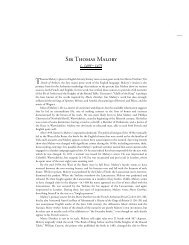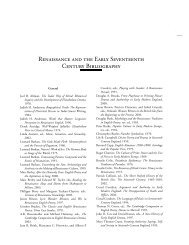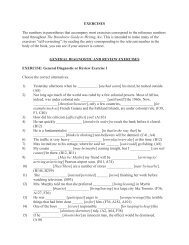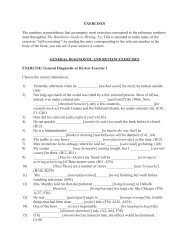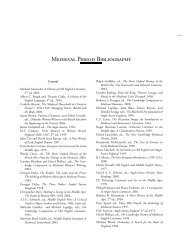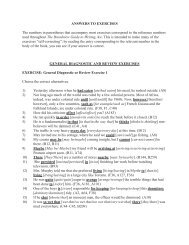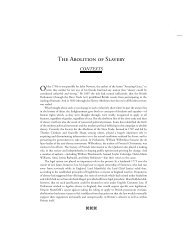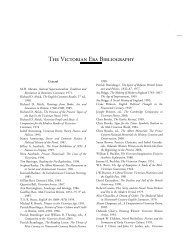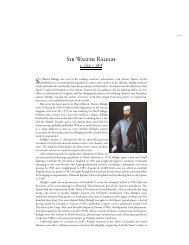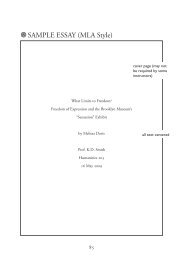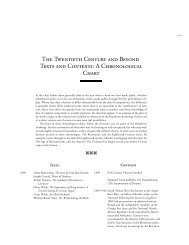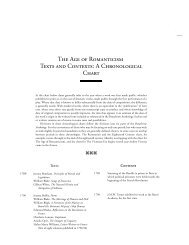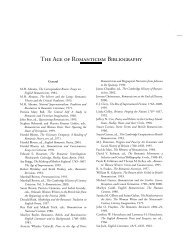Thomas Lodge - Broadview Press Publisher's Blog
Thomas Lodge - Broadview Press Publisher's Blog
Thomas Lodge - Broadview Press Publisher's Blog
Create successful ePaper yourself
Turn your PDF publications into a flip-book with our unique Google optimized e-Paper software.
80<br />
85<br />
90<br />
95<br />
100<br />
105<br />
his courtesies, enterprising his attempts with<br />
Metellus’s constancy, and finishing the same with<br />
Alexander’s 1 fortune; who being in years youthful,<br />
in person comely, in discourse pleasant, in riches<br />
mighty was sought unto by divers princes, who<br />
intended by inserting him into their lineage the<br />
better to assure themselves in their livelihoods. 2<br />
Among the rest, the worthy Duke of Burgundy<br />
wrought so earnestly and persuaded so effectually<br />
that Aubert at last accepted his fair sister Ynda or<br />
Editha for his wife, a princess in whom nature<br />
planted as much excellence as amiableness, tempering<br />
the gifts of fortune and the mind with<br />
such equability that her goods seemed great in<br />
respect of her goodness, and her goodness more<br />
great in that she had goods. For as the mighty<br />
inundations of Nilus make the river more<br />
famous, so ability united with bounty, and a liberal<br />
hand with a merciful heart, do greatly assist in<br />
causes of honour. These two princely couples<br />
[were] ordained by destiny to high disasters;<br />
though their affluence of riches promised them<br />
felicity, yet the influence of the heavens intimated<br />
their adversity: for having great signories 3 to<br />
bequeath, they had no heirs to enjoy, accompting<br />
this for their only cross, 4 that they were without<br />
children. Many were their vows, but to no avail;<br />
many their prayers, but to little purpose. If<br />
physic 5 might have made fruitful, Editha had<br />
been a mother; if great sums could have purchased<br />
young sons, Aubert had been a father.<br />
Seven years and more lived they in this sort, the<br />
1 Metellus perhaps, Quintus Caecilius Metellus (d. c. 63 BCE), surnamed<br />
“Pius” because of his famed devotion to his father, who had<br />
been exiled, and his continued opposition to his father’s foes; Alexander<br />
Alexander III, surnamed the “Great,” of Macedon (356-323<br />
BCE), famed general who conquered much of the ancient world,<br />
including Greece and Egypt; just before his death, he had conquered<br />
India and invaded Scythia, from which he returned to Babylon with<br />
fabulous riches.<br />
2 livelihoods estates, landed or inherited property; thus, more generally,<br />
patrimony.<br />
3 signories domains, territories.<br />
4 accompting … cross i.e., accounting or reckoning this their only trial,<br />
affliction, trouble.<br />
5 physic medicine, medical knowledge, and practice.<br />
T HOMAS L ODGE<br />
110<br />
115<br />
120<br />
125<br />
130<br />
8<br />
one careless of love’s delight, 6 the other comfortless<br />
in that she was barren, till on a prefixed Saturday—when<br />
nature had poured all her treasures<br />
on the earth, Flora powdered all the meadows<br />
with flowers, when the lovesick Zephyrus 7 softly<br />
breathed and the tender leaves sweetly bowed,<br />
when the sun played with the wave and the wave<br />
dallied with the sun, both enjoying an equal sympathy<br />
of solace—Duke Aubert (who from his<br />
youth upward was marvellously delighted in the<br />
chase) accompanied with his fair Duchess<br />
departed out of his capital city of Rouen 8 to take<br />
his pastance 9 in the forest. Editha (by divine ordinance)<br />
was that day attired as if she intended to<br />
woo Lucina 10 to grant a son and win the Norman<br />
duke to get 11 a son. Her hair, instead of gold to<br />
grace it, was golden exceeding gold, more finer<br />
than the thread wherewith Arachne 12 wrought her<br />
loom, more softer than the bed of roses wherein<br />
the Morning played with Cephalus. 13 Bound it was<br />
after a careless manner as if disdaining that so rare<br />
beauties should be imprisoned, but plaited in such<br />
sort as if nature should make a labyrinth for love.<br />
Love could not wish a sweeter labyrinth. Midst<br />
6 careless of love’s delight The meaning here is somewhat unclear. The<br />
narrator suggests either that Aubert is free from anxiety (he is “careless”)<br />
concerning sex (“love’s delight”), or that he is negligent in<br />
engaging in sex.<br />
7 Flora … Zephyrus Flora was the Roman goddess of flowers and<br />
gardens. Some ancient writers say that she married Zephyrus, one of<br />
the winds, son of Atreus and Aurora, goddess of the dawn;<br />
Zephyrus’ very breath had the power to generate fruits and flowers.<br />
8 Rouen a city in France on the Seine (85 miles NW of Paris); capital<br />
of the dukes of Normandy (Topographical Dict., p. 441).<br />
9 pastance recreation, pastime.<br />
10 Lucina goddess of childbirth.<br />
11 get i.e., beget.<br />
12 Arachne In classical mythology, a mortal woman famed as a<br />
weaver. Having challenged the goddess Pallas Athena (Minerva) to a<br />
contest to see which of them was the better artist, she was struck by<br />
the goddess, who was enraged at the perfection of Arachne’s tapestry<br />
which showed the vices of the gods. Arachne hung herself in<br />
response and Pallas in pity transformed her into a spider (Ovid, Metamorphoses,<br />
pp. 134-38).<br />
13 Morning … Cephalus Aurora (goddess of the dawn or the morning)<br />
fell in love with and kidnapped Cephalus, king of Thessaly, whose<br />
only desire was to return to his beloved wife, Procris. For the story of<br />
Cephalus and Aurora, see Ovid, Metamorphoses, pp. 174-75.



